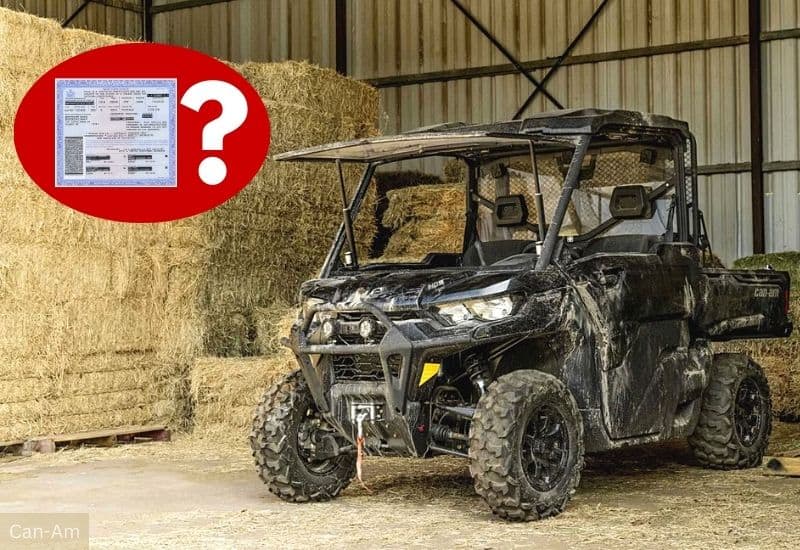Utility task vehicles, commonly known as UTVs or side-by-sides, have exploded in popularity over the last few years among outdoor enthusiasts.
Thanks to their added utility and functionality compared to other types of off-road vehicles, like ATVs and dune buggies.
As the popularity of UTVs continues to grow, however, so does the importance of understanding the legal aspects of owning one.
This leads us to a common question that most new powersport owners have, which is if UTVs have titles like cars and trucks.
Unfortunately, there is not a simple yes or no answer to this question, as it depends largely on your state’s vehicle titling and registration laws.
So to help clear up the confusion, we created this guide to not only answer whether UTVs have a title, but also to answer, how to title one, what the benefits are of titling one, and the dangers of buying one without a title.
What Exactly Are Vehicle Titles?
A vehicle title is a legal document establishing proof of ownership and any liens against that vehicle.
Similar to a property deed, it includes key details like:
- The Vehicle’s Year, Make, Model, and Vehicle Identification Number (VIN)
- Name or Names of Registered Owners
- Address of Registered Owners
- Lienholder Information (If Financing was Used)
- Vehicle History like Salvage or Repaired Status
Vehicle titles serve several important functions:
- Registration/Renewals – Most states require a title to initially register and renew the registration on motor vehicles. The title proves ownership for registration purposes.
- Buying/Selling – They facilitate transfers of ownership during private party sales or when trading in at dealerships. Titles show any outstanding loans that still need to be paid off too.
- Insurance Requirements – Insurance companies often require a title before insuring a vehicle. This helps prove ownership of the vehicle you wish to insure.
- Preventing/Reporting Theft – Titled vehicles can be reported to state agencies as stolen. Titling creates a paper trail to help deter potential thieves.
So in short, a vehicle title establishes your legal claim and facilitates transactions like registration, sales, and insurance coverage.
Do UTVs Have Titles?
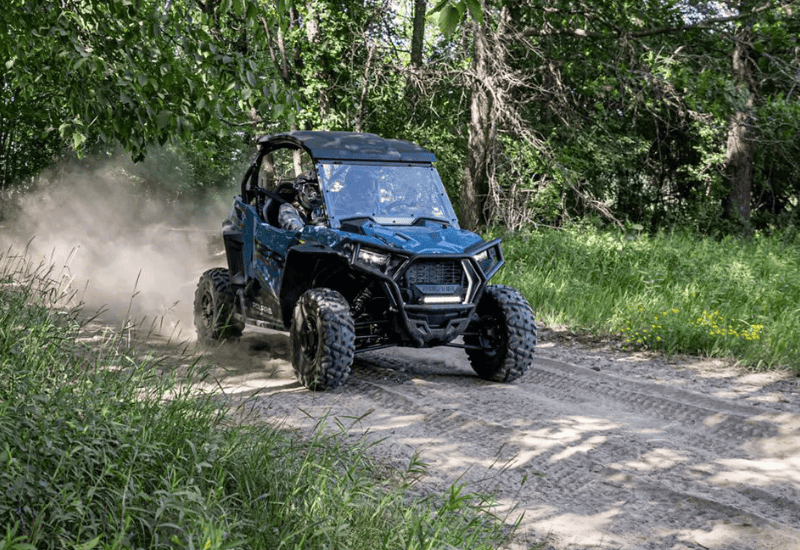
UTV titling requirements vary significantly from one state to another.
Some states, require all UTVs to have titles, including off-road-only units, while others only require street-legal UTVs driven on public roads to be titled. Still, others have no titling laws whatsoever for UTVs.
So whether your side-by-side needs a title depends largely on how and where it will be used.
Because of this, we’ve broken down UTV titling laws by state.
UTV Titling Requirements by State (Listed Alphabetically)
More than three-quarters of all states have enacted some form of UTV titling requirements according to state vehicle codes.
- Alabama – May voluntarily register UTVs and recreational off-highway vehicles with the Alabama Law Enforcement Agency (ALEA).
- Alaska – Will issue a title only if the owner requests to register it to drive on public roads.
- Arizona – Titles are mandatory for all UTVs, whether off-road or street driven. Even non-highway legal UTVs must obtain an Arizona off-highway vehicle title.
- Arkansas – Off-highway vehicles must be registered with the Arkansas Department of Revenue.
- California – Off-highway vehicles do not require regular vehicle registration, but they must display an ID plate or placard issued by the DMV.
- Colorado – Requires an individual to obtain title before selling an off-highway vehicle to a dealer. Obtaining a title is optional for private party to private party sales.
- Connecticut – Must obtain registrations for ATVs owned and operated. Registration is not required if used on property owned or leased by the ATV owner.
- Delaware – Registration of off-highway vehicles is required state-wide.
- Florida – Off-highway and all-terrain vehicles are titled, but not registered, and are not required to be insured with PIP and PDL coverage.
- Georgia – Does not register or title all-terrain vehicles or off-road vehicles.
- Hawaii – Hawaii does not require registration to operate in off-highway areas or public lands. However, non-licensed vehicle use is only allowed on designated trails with a required permit.
- Idaho – If you purchased a UTV on or after July 1st, 2006, you must title it. If you purchased it before that date, you are strongly encouraged to title it but are not required to do so.
- Illinois – Certificate of title required through the Secretary of State if purchased after January 1st, 1998.
- Indiana – Off-Road Vehicles (ORVs), which include UTVs, purchased after December 31st, 2009 must be titled with the BMV.
- Iowa – All UTVs that are registered are required to be titled. If a lien is placed on the UTV it must be titled. Once titled, it is always titled.
- Kansas – UTVs must be titled as non-highway vehicles. A UTV being sold or traded must be titled in the name of the person selling it.
- Kentucky – All ATVs and UTVs are required to be titled.
- Louisiana – Any utility terrain vehicle operated upon a parish road or municipal street must be registered with the state, as an off-road vehicle and display a decal issued by the Office of Motor Vehicles.
- Maine – Off-highway vehicle registration is required through the state. Registration is not required for an ATV operated on land that the ATV operator owns or leases.
- Maryland – OHV registration is required and you must display the corresponding decal on your UTV.
- Massachusetts – You must register your UTV before operating it.
- Michigan – Required to obtain an off-road recreational vehicle certificate of title for ORVs and ATVs through the Secretary of State.
- Minnesota – All-terrain vehicles, including UTVs owned by residents, must be registered unless exempt with the DNR.
- Mississippi – ATVs, including UTVs, may be voluntarily titled
- Missouri – Recreational off-highway and utility vehicles are not required to be titled or registered.
- Montana – To ride your OHV on public land or trails, it must be registered. A certificate of title is required to license and register your OHV.
- Nebraska – A Certificate of Title is required for all ATVs sold new on or after January 1st, 2004.
- Nevada – All off-highway vehicles greater than 70cc, and 1976 or newer, must be registered and display a registration decal to operate legally.
- New Hampshire – Off-highway recreational vehicles must be registered if operated off the owner’s property.
- New Jersey – ATVs, must be registered to operate on public highways or lands.
- New Mexico – Requires all OHV users to register their OHVs if used on public land.
- New York – ATVs must be registered with the Department of Motor Vehicles if it is operated anywhere in the state, including the owner’s property.
- North Carolina – Any owner of an all-terrain vehicle or utility vehicle may apply for a certificate of title.
- North Dakota – OHVs operated on public land must be registered with the Department of Transportation.
- Ohio – UTVs are only titled for ownership purposes upon the owner’s request. A certificate of title is not required when only being used on private property.
- Oklahoma – Registration is required for ATVs and UTVs with the Tax Commission. If used solely for agricultural purposes, you are exempt, however, you can register if you want.
- Oregon – Titles are not required for Class IV ATVs (side-by-sides).
- Pennsylvania – All ATVs except those used solely for business or agricultural purposes have to be registered and titled.
- Rhode Island – Every recreational vehicle, except those exempted under Sec. 31-2.2-2, must be registered and numbered.
- South Carolina – UTV titling optional.
- South Dakota – Off-road vehicles may not be registered or licensed for highway use but must be titled.
- Tennessee – OHV owners not registering the vehicle for the roads can still have a title issued. If a title has been issued a Department of Revenue sticker must be affixed to the vehicle. Required if operating in state parks or game reserves.
- Texas – Off-highway vehicles (ATVs, UTVs) must be titled, but these vehicles are not eligible for registration.
- Utah – Every off-highway vehicle operated or transported in the state must be registered. Off-highway vehicles that are 1988 or newer must also be titled.
- Vermont – Residents must title ATVs.
- Virginia – New ATVs powered by an engine displacing more than 50cc must be titled. Used ATVs can be titled optionally.
- Washington – Must title and register your wheeled all-terrain vehicle (WATV) within 15 days of purchase.
- West Virginia – All UTVs since December 28th, 2010 are required to be titled, but not registered.
- Wisconsin – ATV/UTVs are not titled. However, upon transfer of ownership of an ATV or UTV that is registered, the seller must give the registration certificate card to the buyer. The buyer then must complete an application for transfer within 10 days.
- Wyoming – Any multipurpose vehicle driven on public roads must be titled, registered, licensed, and insured.
Why UTV Titling is Often Required & Generally a Good Idea
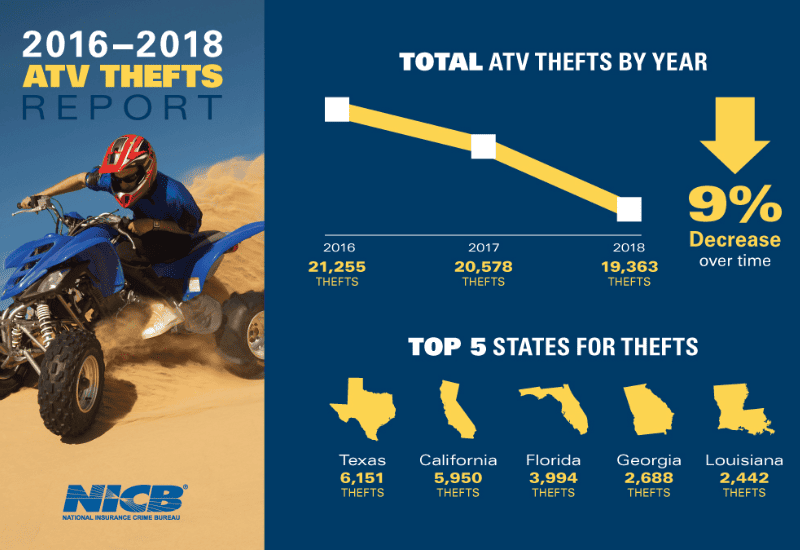
- Helps to Reduce Theft
- If Theft Does Occur Makes Vehicle Recovery Easier
- Establishes Clear Legal Ownership
- Ensures Legal Compliance With State & Federal Regulations
- Sales Tracking
- Provides Protection From Buying Stolen or Encumbered Vehicles
- Easier Insurance Claims Processing
- Easier Vehicle Registration
There are many reasons why UTV titling is required and a good idea, however, one of the biggest is that it helps prevent theft and aids in recovery.
While it’s difficult to extract a direct correlation, ATV thefts have been trending down according to the National Insurance Crime Bureau over the last few years, which correlates with more states requiring titling for off-road or off-highway vehicles.
Unlike street-legal vehicles, UTVs and ATVs have historically been exempt from titling and registration requirements in many states if used exclusively off-road.
States, however, are increasingly requiring titles to crack down on UTV theft, as it makes it much easier to report and recover stolen machines.
Surprisingly though, 12 state governments still don’t require any type of recreational vehicle titling or registration for off-highway vehicles like ATVs and UTVs.
The reasoning?
Some states don’t believe burdensome regulations and fees should apply to vehicles operated solely on private lands for recreation and farming activities.
Without road use, mandating registrations and titling seems less justified.
How to Title Your UTV Properly
Wondering how to title your side-by-side if required in your state?
While the process can vary somewhat from state to state, the process works similarly to titling a car or truck:
1. Gather Necessary UTV Title Paperwork
To title a UTV, you’ll typically need:
- Completed title application form.
- Bill of sale documenting purchase info.
- Manufacturing certificate of origin (MSO) or existing title signed over.
- Odometer disclosure.
- UTV registration fees.
2. Submit Documentation
Submit paperwork to your local DMV or county tax assessor office to be entered into the motor vehicle database.
3. Receive Your Title
Once processed, your new UTV title will be mailed containing ownership, VIN confirmation, and lienholder data if financed.
Check your state agencies for complete recreational vehicle titling steps, a great place to start are the above links we provided for each state.
Key Benefits of Titling Your UTV
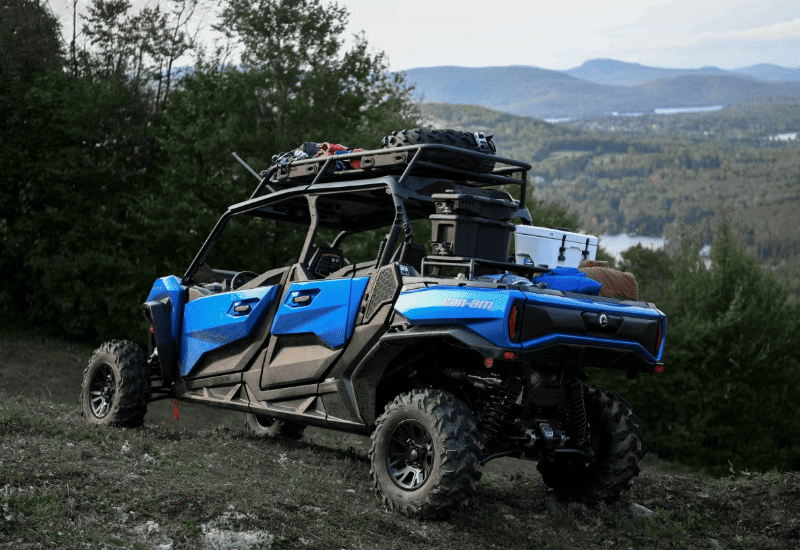
While not all states mandate recreational off-road vehicle titling, you should consider these top benefits of obtaining one voluntarily:
- Theft Deterrent – Over 20,000 ATVs are stolen annually in the US according to the most recent data. Titling creates crucial ownership documentation making theft more difficult. State records also aid law enforcement recovery.
- Insurance Verification – Insurers often require proof of ownership before issuing policies. Titling simplifies insuring your machine.
- Buyer Reassurance – Titles let buyers verify lien, brand, and ownership history for used UTV purchases. This provides greater sales transparency and value.
- Registration Renewals – States that require registration for UTVs also require updated ownership confirmation via titles during renewals.
Because of all these reasons, in my opinion, you should ask your local DMV about optional UTV titling, even if not mandated in your state.
Buying a Used UTV With No Title – Beware!
With hot demand for used recreational off-road vehicles, you may run across tempting deals on title-less machines:
- Online listings for UTVs without titles are offered at big discounts.
- Auction yard sales missing proper ownership paperwork.
- Inherited or farm ATVs/UTVs lacking documentation.
Lack of proper titling should raise several red flags for buyers:
- Stolen Machine Possibility – Missing title info prevents stolen vehicle checking.
- Registration Hassles – States will reject registration attempts without the correct papers. You may have to pursue a costly bonded or court-ordered title.
- No Usage History – Undisclosed damage or mileage rollbacks are common on machines without ownership records present.
Carefully verify the UTV’s VIN through NICB first before considering any title-less purchase. Be prepared to secure new title paperwork if pursuing one without documentation.
Do UTVs Have VIN Numbers?
As highlighted earlier, all UTVs, and ATVs for that matter, contain a 17-character vehicle identification number (VIN) stamped onto the frame.
This is the side-by-side’s unique “fingerprint” for inspecting records and ownership.
Finding your UTV’s VIN depends a bit on the machine’s individual make and model. But commonly checked locations include:
- Stamped on the vehicle frame beneath the cargo box.
- The front lower corner of the dash housing/frame.
- Rear axle housing area.
Dealerships and insurance providers will require this number to verify identity and ownership status. In addition, states will typically require the VIN if applying for a title after purchase.
So be sure to locate and record your UTV’s unique VIN right away for quick access later.
Conclusion – Be Informed on UTV Titling Laws
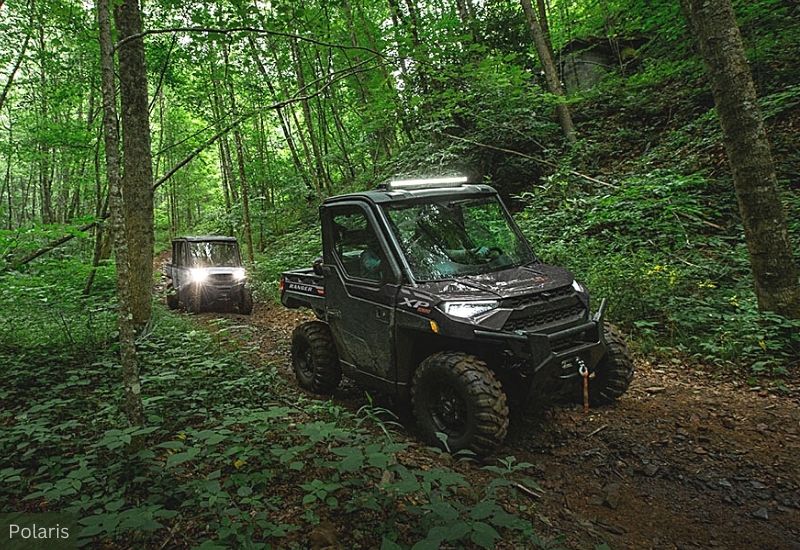
With UTV titling laws constantly evolving, the most important takeaway is to check your state’s specific requirements based on intended usage.
While often exempted for exclusive off-road operation, over three-quarters of the states now how some level of UTV/ATV titling laws.
And considering all the benefits of UTV titling, even if you happen to live in a state like Georgia or South Carolina that doesn’t require titling, in my opinion, it’s still a good idea.
Recent Posts
Are you thinking about buying a Gator UTV? If so, you need to read this post, as we answer 10 common questions about the John Deere Gator, providing you with all the information you need to make...
In recent years, off-road enthusiasts have been taking their adventures to the next level by installing UTV underglow lights on their side-by-sides. Which adds a unique visual appeal and improves...

